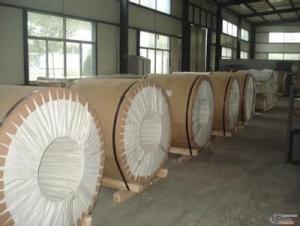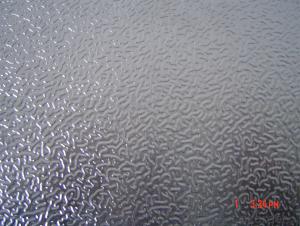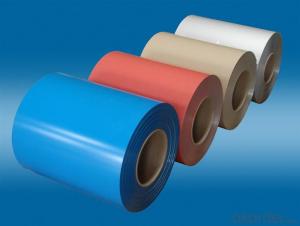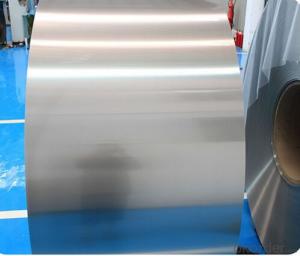Supply aluminum coil products supplier in China
- Loading Port:
- China main port
- Payment Terms:
- TT or LC
- Min Order Qty:
- 3 m.t.
- Supply Capability:
- 17 m.t./month
OKorder Service Pledge
OKorder Financial Service
You Might Also Like
Aluminium is a relatively soft,durable, lightweight, ductile and malleablemetalwith appearance ranging from silvery to dull gray, depending on the surfaceroughness. It is nonmagnetic and does not easily ignite. A fresh film ofaluminium serves as a good reflector (approximately 92%) of visible light and an excellent reflector (asmuch as 98%) of medium and far infrared radiation. The yield strengthof pure aluminium is 7–11 MPa, while aluminium alloys have yield strengths ranging from200 MPa to 600 MPa. Aluminium has about one-third the density and stiffness of steel.It is easily machined, cast, drawn and extruded.
Aluminium alloys (or aluminum alloys; see spellingdifferences) are alloysin which aluminium(Al) is the predominant metal. The typical alloying elements are copper, magnesium,manganese,silicon,tin and zinc. There are twoprincipal classifications, namely casting alloys and wrought alloys, both of which are furthersubdivided into the categories heat-treatableand non-heat-treatable. About 85% of aluminium is used for wrought products,for example rolled plate, foils and extrusions.Cast aluminium alloys yield cost-effective products due to the low meltingpoint, although they generally have lower tensile strengthsthan wrought alloys. The most important cast aluminium alloy system is Al–Si,where the high levels of silicon (4.0–13%) contribute to give good castingcharacteristics. Aluminium alloys are widely used in engineering structures andcomponents where light weight or corrosion resistance is required
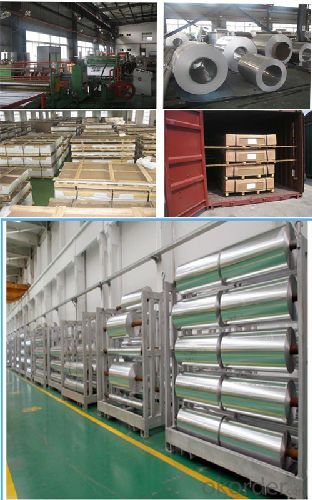
Features:
1. Excellent quality of products
2. Quick delivery
3. Best service to clients
4. BV,SGS avalible
5. No buckle o waveness
6. Tension leveling
7. Certificate of Origin
8. Form A,E
Packaging Detail: Carton ,Wooden pallet with plastic protection packing,standard seaworthy packing or as your request.
ProductionCapacity:
AnnualProduction capacity of 600,000 tons.
Products areexported to United States, Canada, U.A.E, Brazil, Mexico,Thailand, Vietnam,Nigeria etc, over 100 countries andregions all over the world.
Coveredfactories with full production line
CNBM aluminumproduction base is comprised of 18 aluminumannealers, 10 coil and foilmills, 4 continuous production lines, 2hot rolling production line and 3prepainted lines.
FAQ:
1. What is the form of payment?
Normally 30% TT, L/C
2. Type of quotation?
FOB, CFR, CIF
3. Port of loading?
Shanghai port
4. Delivery time?
30 day after client’s deposit
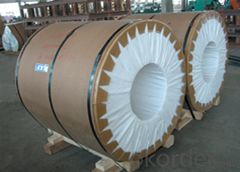
Colored aluminum sheets advantages:
The colored aluminum sheet has the advantages of both aluminum and the organic material, having both high mechanical strength of the aluminum plate, good toughness, easy processing performance advantages, but also has an organic polymer coating material is good coloring, decorative, corrosion resistance, can easily punching, bending, deep drawing, welding and other processing, products made of practical, decorative, easy processing and durable. Colored aluminum is widely used in industrial plants, railway stations, airports, stadiums, commercial buildings, homes and other buildings and manufacturing all kinds of home appliances and so on.
Colored aluminum sheet has been widely used in foreign countries, and with the continued rapid growth of China's economic construction over the past decade, Colored aluminum sheet applications and growing demand. Because of its widespread use, easy processing, long service life, light weight (specific gravity is 1/3 of iron), low unit cost, anti-fouling coatings cleaning, beautiful rich color, green and so gradually become Colored aluminum sheet industry the future direction of the market demand for larger.
- Q:Can aluminum coils be used in food processing industries?
- Yes, aluminum coils can be used in food processing industries. Aluminum is a widely used material in food processing due to its numerous advantageous properties. It is lightweight, flexible, and has excellent thermal conductivity. These qualities make aluminum coils ideal for applications such as refrigeration, heat exchangers, and ovens in the food processing industry. Additionally, aluminum is non-toxic, corrosion-resistant, and does not impart any odor or taste to the food products being processed. This makes it a safe and hygienic choice for food processing equipment. Furthermore, aluminum coils are easy to clean and maintain, which is crucial in maintaining the highest standards of cleanliness and food safety. Overall, aluminum coils are widely accepted and used in food processing industries due to their superior performance and suitability for food-related applications.
- Q:Aluminum alloy coil quotation = = how much is the price?
- 8.3 kilometers, towards the Heze / Dongping /G35 direction, a little right turn, into the Canton Expressway11. along the economy wide highway 280 meters, Ji'nan Yin Jia Lin hub interchange after about 160 meters, go straight into the economy wide highway12., along the Canton Expressway 50.7 kilometers, in Pingyin exports, slightly turn right into the Pingyin interchange13., along the Pingyin interchange 510 meters, 650 meters after crossing Pingyin, straight14. drive 440 meters, turn left ahead into G220 (old)15. along the G220 (old) 1.1 km road, go straight into the Ping Street16. along the Ping Street 3.1 km road, turn left into the road rose17. drive along Rose Road for 510 meters, to the finish line (on the right side of the road)Terminus: Pingyin forever Aluminium Industry Co., Ltd.
- Q:What are the common surface finishes for aluminum coils in the electrical industry?
- In the electrical industry, aluminum coils are commonly used for various applications such as transformers, motors, and electrical enclosures. These coils are often subjected to different surface finishing processes to enhance their performance and longevity. One of the most common surface finishes for aluminum coils in the electrical industry is anodizing. Anodizing involves creating a protective oxide layer on the surface of the aluminum through an electrochemical process. This layer not only provides excellent corrosion resistance but also improves the coil's durability and electrical insulation properties. Another popular surface finish is chemical conversion coating, also known as chromate conversion coating. This process involves treating the aluminum surface with a chemical solution to create a thin layer of protective coating. The coating not only provides corrosion resistance but also improves the adhesion of subsequent coatings or paints applied to the coil. Powder coating is another common surface finish used in the electrical industry for aluminum coils. It involves applying a dry powder onto the coil's surface and then curing it under heat to create a durable and attractive finish. Powder coating provides excellent resistance to chipping, scratching, and fading, making it ideal for applications where aesthetics and durability are important. In addition to these surface finishes, aluminum coils in the electrical industry may also undergo other treatments such as lacquering or painting. Lacquering involves applying a clear protective coating to the coil's surface, providing a glossy and protective finish. Painting, on the other hand, involves applying a colored coating to the surface for aesthetic purposes while also providing protection against corrosion. Overall, the choice of surface finish for aluminum coils in the electrical industry depends on the specific requirements of the application. Factors such as corrosion resistance, electrical insulation, durability, and aesthetics play a significant role in determining the most suitable surface finish for a given application.
- Q:What are the different coil edge profiles available for aluminum coils?
- Some of the different coil edge profiles available for aluminum coils include slit, deburred, rounded, and full round edges.
- Q:where's the best place to look for aluminum not cans
- TRY A LOCAL HARDWARE STORE
- Q:Can aluminum coils be used in the production of aluminum windows?
- Yes, aluminum coils can be used in the production of aluminum windows. Aluminum coils are often used as a raw material in the manufacturing process of aluminum windows. These coils are typically made from high-quality aluminum and are rolled into thin, flat sheets. These sheets can then be cut and shaped into the desired frame size and design for the windows. Aluminum is a popular material for window frames due to its durability, lightweight nature, and resistance to corrosion. The use of aluminum coils in the production of aluminum windows allows for efficient and cost-effective manufacturing processes while also providing a high-quality end product.
- Q:What are the typical lead times for ordering aluminum coils?
- The typical lead times for ordering aluminum coils can vary depending on various factors such as the supplier, quantity, customization requirements, and current market conditions. However, on average, lead times can range from a few weeks to a couple of months. It is advisable to contact the specific supplier for accurate information regarding their lead times.
- Q:What is the role of aluminum coils in the transportation industry?
- Aluminum coils play a crucial role in the transportation industry due to their numerous advantageous properties. One of the primary uses of aluminum coils is in the manufacturing of transportation vehicles, such as cars, trucks, trains, and airplanes. Aluminum is a lightweight material, with a density significantly lower than steel, which makes it an ideal choice for enhancing fuel efficiency and reducing overall weight in transportation systems. The use of aluminum coils in transportation vehicles provides several benefits. Firstly, the lightweight nature of aluminum helps increase fuel efficiency, as vehicles require less energy to move with reduced weight. This results in lower fuel consumption, reduced greenhouse gas emissions, and cost savings for transportation companies. Moreover, aluminum coils possess excellent corrosion resistance properties, allowing transportation vehicles to withstand harsh weather conditions, such as rain, snow, and salt exposure. This durability is particularly essential for transportation vehicles that frequently operate in coastal or snowy regions. The resistance to corrosion also enhances the longevity of the vehicles, reducing maintenance costs and ensuring a longer lifespan. In addition to their weight and corrosion resistance properties, aluminum coils offer high strength-to-weight ratio, making them a reliable choice for structural components in transportation vehicles. This strength allows manufacturers to design lighter and more efficient vehicles without compromising safety or durability. Furthermore, aluminum coils contribute to the sustainability efforts of the transportation industry. Aluminum is a highly recyclable material, and the recycling process requires significantly less energy compared to its initial production. By utilizing aluminum coils in transportation vehicles, the industry can minimize its environmental impact and reduce the reliance on non-renewable resources. In conclusion, aluminum coils play a pivotal role in the transportation industry by contributing to fuel efficiency, corrosion resistance, lightweight design, structural strength, and sustainability. Their use in manufacturing transportation vehicles helps achieve cost savings, reduce emissions, enhance durability, and improve overall efficiency in the transportation sector.
- Q:What are the potential health hazards of working with aluminum coils?
- Potential health hazards of working with aluminum coils include inhalation of aluminum dust or fumes, which can lead to respiratory issues such as asthma or lung damage. There is also a risk of skin irritation or allergies from direct contact with aluminum, as well as the possibility of eye irritation if particles come into contact with the eyes.
- Q:What is the typical coefficient of thermal expansion for aluminum coils?
- Aluminum coils usually have a coefficient of thermal expansion around 23 x 10^-6 per degree Celsius. This implies that with each degree Celsius rise in temperature, the length of the aluminum coil will expand by 23 parts per million. The coefficient of thermal expansion holds significance in the design and handling of aluminum coils, as it impacts their dimensional stability and can induce thermal strains in the material due to temperature fluctuations.
1. Manufacturer Overview |
|
|---|---|
| Location | |
| Year Established | |
| Annual Output Value | |
| Main Markets | |
| Company Certifications | |
2. Manufacturer Certificates |
|
|---|---|
| a) Certification Name | |
| Range | |
| Reference | |
| Validity Period | |
3. Manufacturer Capability |
|
|---|---|
| a)Trade Capacity | |
| Nearest Port | |
| Export Percentage | |
| No.of Employees in Trade Department | |
| Language Spoken: | |
| b)Factory Information | |
| Factory Size: | |
| No. of Production Lines | |
| Contract Manufacturing | |
| Product Price Range | |
Send your message to us
Supply aluminum coil products supplier in China
- Loading Port:
- China main port
- Payment Terms:
- TT or LC
- Min Order Qty:
- 3 m.t.
- Supply Capability:
- 17 m.t./month
OKorder Service Pledge
OKorder Financial Service
Similar products
New products
Hot products
Hot Searches
Related keywords

